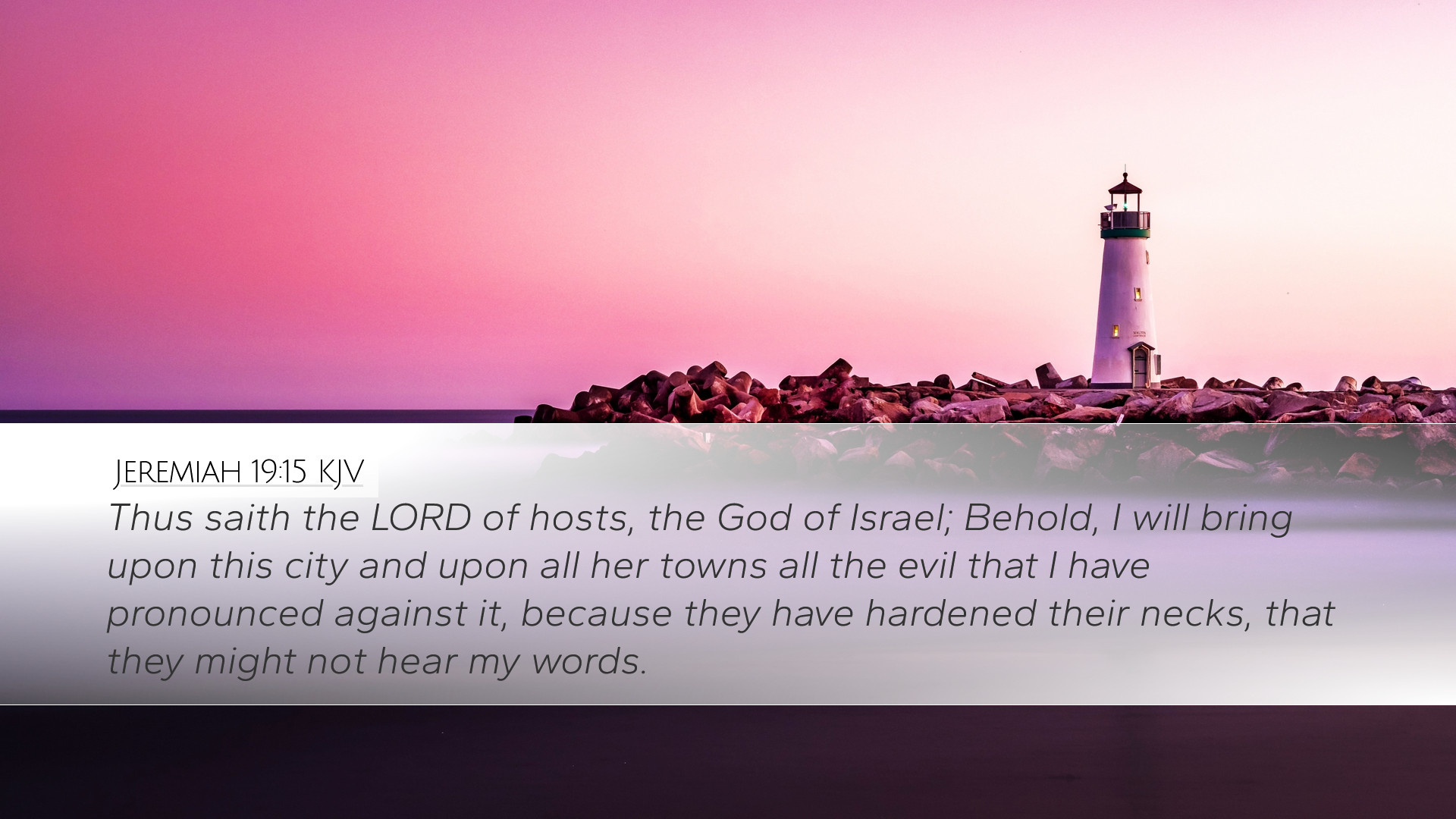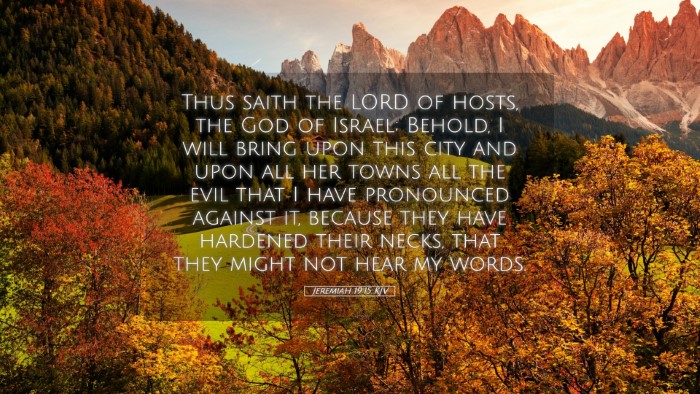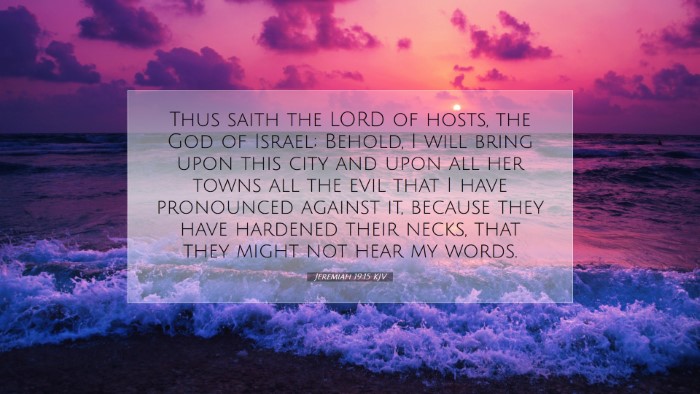Commentary on Jeremiah 19:15
Verse: "Thus says the Lord of hosts, the God of Israel: 'Behold, I am bringing upon this city and upon all its towns all the evil that I have pronounced against it, because they have hardened their hearts, refusing to hear my words.'" (Jeremiah 19:15, ESV)
Introduction
The context of Jeremiah 19 reveals a significant moment in the prophetic ministry of Jeremiah. As he conveys God's impending judgment upon Jerusalem, it is crucial to understand the gravity of the situation. This commentary gathers insights from renowned public domain scholars such as Matthew Henry, Albert Barnes, and Adam Clarke to elucidate the profound implications of this verse.
Contextual Background
Jeremiah, often referred to as the "weeping prophet," served during the late 7th and early 6th centuries BC, a time of great turmoil for the nation of Judah. Israel had failed to abide by the covenant established with God and had repeatedly turned to idol worship and other sins. In this chapter, God instructs Jeremiah to symbolize the nation's impending judgment through the breaking of a pottery jar, a powerful metaphor for the fragility of Judah's situation. This verse encapsulates God’s response to the people's hard-heartedness and their refusal to heed divine warnings.
Insights from Public Domain Commentaries
Matthew Henry's Commentary
Matthew Henry emphasizes the certainty of God's judgment as a consequence of persistent disobedience. He articulates that God’s threats were not mere words but a prelude to action against a city that had ignored the prophets' calls to repentance. Henry points out that God's patience had been exhausted, and the continuation of sin led to a hardened heart, a state that ultimately renders people impervious to divine warnings. The phrase "hardened their hearts" signifies a conscious choice to reject God's Word, which is a theme that resonates throughout Scripture regarding the human condition.
Albert Barnes' Commentary
Albert Barnes provides a detailed analysis of the socio-political context within which this prophecy was given. He highlights that the people of Jerusalem were engaging in idolatrous practices and had forsaken the commandments of God. Barnes connects the idea of "all the evil" with the notion of divine retribution, indicating that their actions would not go unpunished. The warning serves as a stark reminder that sin leads to destructive consequences not just for individuals but for entire nations. He suggests that the judgment is both a natural outcome of their actions and a divine decree, showcasing both God’s sovereignty and justice.
Adam Clarke's Commentary
Adam Clarke elaborates on the significance of God's declaration through Jeremiah, indicating that this judgment was not arbitrary but rather a reflection of the people’s choices and behaviors. Clarke points out that the repeated refusal to listen resulted in a cumulative effect where the nation reached a point of no return. He emphasizes that God's communication through prophets is an act of love intended to guide His people back to righteousness. The phrase "refusing to hear my words" is particularly poignant; it underscores a deliberate choice against divine wisdom and guidance, highlighting the tragic consequence of such a path.
Theological Implications
This verse raises critical theological considerations regarding human agency, divine justice, and the nature of God’s communication with humanity. It serves as a reminder that:
- Human Responsibility: Individuals and communities are accountable for their choices and actions. The hardening of the heart is a warning against the dangers of persistently ignoring divine counsel.
- Divine Patience: God's warnings are manifestations of His patience and mercy. The call to repentance is an invitation for restoration, which can only be rejected at one's own peril.
- The Reality of Judgment: The verse reiterates that there are tangible consequences for disobedience that extend beyond the spiritual realm into tangible societal and communal ramifications.
Practical Application
For pastors, students, and theologians, Jeremiah 19:15 holds profound lessons for contemporary ministry:
- Call to Repentance: Christians are tasked with proclaiming a message of repentance, equipped by the knowledge that God's judgment follows a refusal to listen.
- Awareness of Spiritual Hardness: It is crucial to recognize the signs of spiritual lethargy within churches and communities. Encouraging open dialogue about doubts, struggles, and theological inquiries can aid in keeping hearts receptive.
- Understanding God's Character: Pastors should emphasize God's dual nature as both loving and just. This balance invites believers to appreciate His grace while remaining aware of the seriousness of sin.
Conclusion
Jeremiah 19:15 encapsulates essential truths about God's dealings with humanity. Through the insights of Matthew Henry, Albert Barnes, and Adam Clarke, we are reminded of the grave consequences that come with the hardening of hearts and the rejection of God's word. The implications extend beyond the ancient context to challenge modern readers to consider their relationship with God, the weight of their choices, and the call to remain responsive to His voice.


